Our Schemes
Our Schemes
At Noora Aman Foundation, we run a variety of dedicated schemes aimed at empowering communities through education, skill development, healthcare, and social welfare. Each scheme is thoughtfully designed to address specific needs of underprivileged groups, ensuring inclusive growth and sustainable impact. Through these initiatives, we strive to create meaningful change and uplift lives across India.
1. HUNAR SE ROZGAR TAK

Hunar Se Rozgar Tak is a flagship initiative by the Ministry of Tourism, Government of India, aimed at equipping youth with essential skills for employment in the growing hospitality and tourism industry. The scheme provides free, short-term vocational training in areas such as food production, bakery, housekeeping, and food & beverage service. Targeted especially at school dropouts and youth from underprivileged backgrounds, the program is designed to enhance employability and open up immediate job opportunities. Participants not only receive practical, industry-oriented training but are also supported with job placement assistance upon completion. The scheme plays a vital role in bridging the skill gap and promoting self-reliance by turning talent into livelihood. Through this initiative, the government aims to empower the youth while strengthening the workforce of one of India’s most vibrant sectors.
Key Highlights of Hunar Se Rozgar Tak:
- Free training programs in areas like food production, food & beverage service, housekeeping, and bakery.
- Short duration courses (typically 6–8 weeks).
- Training conducted through institutes like IHMs (Institutes of Hotel Management) and other hospitality training centers.
- Job placement assistance provided post-training.
- Aimed at increasing employability, especially for school dropouts and youth from rural and disadvantaged backgrounds.
2. PMKVY 4.0
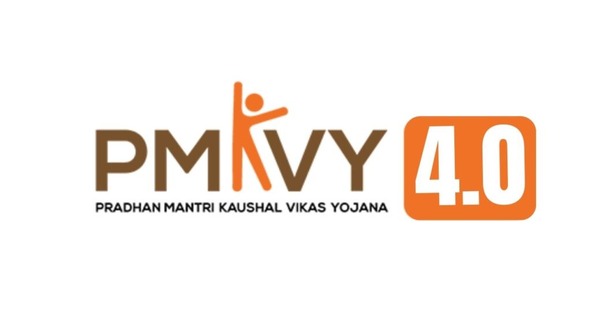
Pradhan Mantri Kaushal Vikas Yojana (PMKVY) 4.0 is the latest phase of the Government of India’s flagship skill development initiative under the Ministry of Skill Development and Entrepreneurship (MSDE). Launched to meet the evolving demands of the job market, PMKVY 4.0 focuses on industry-relevant skill training, particularly in emerging sectors such as AI, robotics, green jobs, 5G, and coding. The scheme aims to empower youth with future-ready skills through short-term training programs, Recognition of Prior Learning (RPL), and skill certification. With a greater emphasis on digital learning platforms, industry partnerships, and localized training centers, PMKVY 4.0 seeks to make skill development more accessible, demand-driven, and aligned with the vision of an Atmanirbhar Bharat (Self-Reliant India). It plays a crucial role in reducing unemployment, promoting entrepreneurship, and bridging the gap between education and employment across the country.
Key Highlights of PMKVY 4.0:
- Focus on Future Skills: raining in emerging technologies such as Artificial Intelligence, Robotics, 5G, Cloud Computing, Green Jobs, and more.
- Demand-Driven Skill Development: Industry-linked training aligned with the current and future needs of the job market.
- Short-Term Training & RPL: Offers Short-Term Training (STT) for fresh candidates and Recognition of Prior Learning (RPL) for experienced individuals.
- Decentralized Training Approach: Training centers established across urban, semi-urban, and rural areas to reach youth from all regions.
- Increased Industry Participation: Greater collaboration with Sector Skill Councils (SSCs), industry bodies, and corporate CSR projects.
- Digital and Hybrid Learning Models: Integration of online training platforms to enhance accessibility and learning flexibility.
- Placement and Entrepreneurship Support: Strong focus on employment linkages, entrepreneurship guidance, and post-training support.
- Inclusive Outreach: Special provisions for women, marginalized communities, school dropouts, and differently-abled individuals.
- National Skill Qualification Framework (NSQF): All courses aligned with NSQF to maintain quality and standardization across sectors.
3. SEEKHO AUR KAMAO

Seekho Aur Kamao is a skill development initiative by the Ministry of Minority Affairs, Government of India, launched to empower youth from minority communities through industry-oriented training and employment support. The scheme specifically benefits individuals from Muslim, Christian, Sikh, Buddhist, Parsi, and Jain backgrounds, focusing on youth aged 14 to 45 years.
This program offers free training in both traditional skills and modern trades, helping participants secure sustainable livelihoods. A significant emphasis is placed on women’s participation, with 33% of seats reserved for female candidates. Training is provided through certified Project Implementing Agencies (PIAs), which also facilitate job placement and post-placement support.
At Noora Aman Foundation, we proudly implement this scheme to promote economic empowerment, gender inclusion, and self-reliance among marginalized communities. Through Seekho Aur Kamao, we help bridge the gap between skill and employment, making India’s workforce more inclusive and future-ready.
Key Highlights of Seekho Aur Kamao:
- Target Beneficiaries: Youth aged 14–45 years from six notified minority communities – Muslims, Christians, Sikhs, Buddhists, Parsis, and Jains.
- Free Skill Training: Offers free, job-oriented skill development in both traditional and modern trades.
- Women Empowerment Focus: 33% reservation for women to promote gender inclusion and economic independence.
- Industry-Relevant Curriculum: Courses aligned with market demand to enhance employability and career readiness.
- Placement Support: Includes job placement assistance and post-placement tracking for continued growth.
- Training by Certified Agencies: Delivered by empaneled Project Implementing Agencies (PIAs) with experience in skill development.
- All-India Coverage: Implemented across multiple states and regions, especially focusing on underserved communities.
- Government Certified Certification: Successful candidates receive recognized skill certificates, increasing credibility in the job market.
4. DDU-GKY (DEEN DAYAL UPADHYAYA GRAMEEN KAUSHALYA YOJANA)
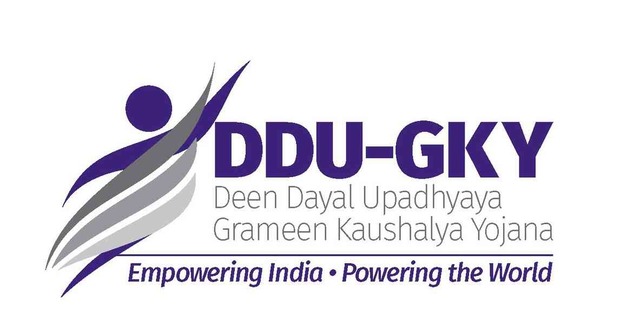
Deen Dayal Upadhyaya Grameen Kaushalya Yojana (DDU-GKY) is a transformative skill development initiative by the Ministry of Rural Development, Government of India, aimed at empowering rural youth from economically weaker sections. Targeting individuals aged 15 to 35 years, the scheme offers free, industry-aligned vocational training to enhance employability and promote sustainable livelihoods. What sets DDU-GKY apart is its placement-linked training model, ensuring that trainees are not only skilled but also employed post-training.
The scheme gives special emphasis to the social inclusion of SC/ST, women, minorities, and differently-abled individuals, bridging the gap between rural talent and urban job opportunities. Training is provided by certified Project Implementing Agencies (PIAs) with support in language skills, digital literacy, soft skills, and on-the-job training. DDU-GKY is operational in over 27 states and union territories, aligning with the vision of Skill India and Atmanirbhar Bharat to create a self-reliant and empowered rural workforce.
Key Highlights of DDU-GKY:
- Target Group: Rural youth aged 15–35 years from Below Poverty Line (BPL) households or registered under the National Rural Livelihoods Mission (NRLM).
- Free Skill Training: Training in high-demand sectors such as retail, healthcare, hospitality, IT, construction, and more.
- Placement-Linked Programs: Focus on 100% placement for eligible candidates through job fairs and corporate tie-ups.
- Inclusive Approach: Special focus on SC/ST, minorities, women, and persons with disabilities to ensure equitable access.
- Residential Facilities & Stipend: Residential training, free uniforms, meals, and monthly stipends for trainees.
- National and International Placement: Opportunities for domestic and overseas employment in skilled job roles.
- Post-Placement Support: Candidates receive counseling, relocation support, and career progression guidance.
- Digital & Life Skills: Courses include soft skills, basic English, computer literacy, and financial education for holistic development.
- Certified PIAs and Infrastructure: Training provided through approved training centers with modern infrastructure and quality benchmarks.
5. AHVY ( AMBEDKAR HASTSHILP VIKAS YOJANA)
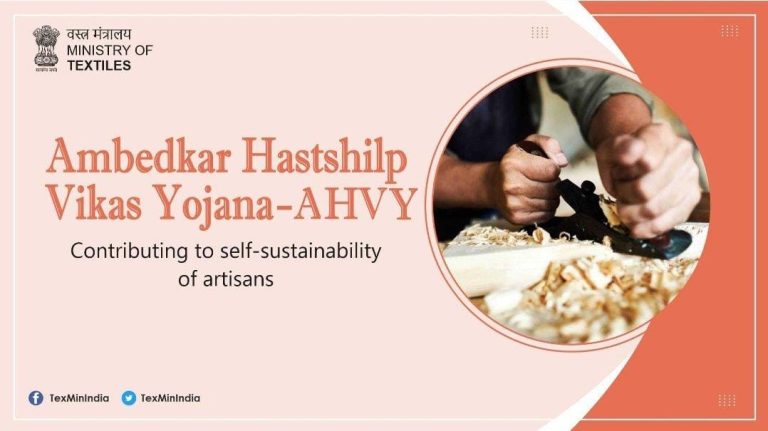
The Ambedkar Hastshilp Vikas Yojana (AHVY) is a central sector scheme launched by the Development Commissioner (Handicrafts), Ministry of Textiles, Government of India, to promote the holistic and sustainable development of India’s rich handicraft traditions, with a special focus on marginalized and underprivileged artisan communities. This scheme aims to organize artisans into self-help groups (SHGs) and producer companies to enhance their income generation potential through skill upgradation, design and technology intervention, product development, and market exposure.
AHVY supports artisans by providing financial aid, modern tools, infrastructure support, and linkages with domestic and international markets. The program not only preserves India’s cultural heritage but also fosters entrepreneurship and economic empowerment among Scheduled Castes, Scheduled Tribes, minorities, and women artisans. Through targeted training, cluster-based development, and branding efforts, the scheme enables artisans to scale their craft production and secure sustainable livelihoods.
By nurturing talent at the grassroots level, AHVY is contributing significantly to the Make in India, Skill India, and Atmanirbhar Bharat initiatives, while promoting inclusive growth in rural and tribal areas.
Key Highlights of AHVY Scheme:
- Cluster-Based Development: Organizing artisans into viable groups and clusters for capacity building and enterprise formation.
- Design and Technology Upgradation: Training in modern techniques, tools, and improved product design while preserving traditional aesthetics.
- Infrastructure Support: Establishment of Common Facility Centers (CFCs), Raw Material Banks, Tool Kits, and Resource Centers.
- Market Access & Promotion: Participation in trade fairs, exhibitions, buyer-seller meets, and support in branding and e-commerce.
- Social Security & Welfare: Linkages with health care, life insurance, and credit facilities for artisan welfare.
- Skill Development & Entrepreneurship: Hands-on training, business mentoring, and skill enhancement to boost self-reliance and productivity.
- Empowerment of Marginalized Artisans: Focus on SC/ST, women, minorities, and differently-abled artisans to ensure inclusive growth.
- Digital Enablement: Promotion of digital marketing and online platforms for expanding market reach and awareness.
6. ESDM(ELECTRONICS SYSTEM DESIGN AND MANUFACTURING)

The ESDM (Electronics System Design and Manufacturing) Scheme is a strategic initiative launched by the Ministry of Electronics and Information Technology (MeitY), Government of India, to promote skill development in the electronics sector and meet the growing demand for trained manpower in Electronics System Design & Manufacturing industries. The scheme aims to bridge the skill gap by providing industry-relevant training to students, school dropouts, unemployed youth, and working professionals, enabling them to secure employment in one of India’s fastest-growing industries.
By supporting training partners and institutions with financial assistance, ESDM fosters a skilled talent pool equipped with practical knowledge in electronics, embedded systems, hardware assembly, repair, and IT-related services. This scheme is aligned with the Skill India and Make in India missions, playing a crucial role in strengthening India’s domestic electronics ecosystem and boosting economic growth through innovation and job creation.
Key Highlights of ESDM Scheme:
- Targeted Skill Development: Focus on building industry-ready skills in electronics design, manufacturing, and embedded systems.
- List Item Wide Beneficiary Base: Open to students, ITI pass-outs, diploma holders, unemployed youth, and working professionals.
- Financial Support: Training costs are partially or fully subsidized by the government, especially for SC/ST, OBC, women, and economically weaker sections.
- Certified Courses: Training provided through NSQF-aligned and MeitY-approved curricula with certification upon completion.
- Placement Support: Assistance in job placements through industry tie-ups and on-the-job training modules.
- Boosts Make in India & Digital India: Encourages domestic talent to support innovation and reduce dependency on electronics imports.
- Support for Training Partners: Approved training centers and institutions receive government grants to conduct courses.
- Flexible Learning: Modular training programs designed to cater to various skill levels and job roles.
7. NGO GRANTS ONLINE APPLICATION TRACKING SYSTEM

The NGO Grants Online Application & Tracking System,, is a digital initiative by the Ministry of Tribal Affairs, Government of India. This scheme is designed to bring transparency, efficiency, and accountability to the process of applying for and tracking government grants provided to Non-Governmental Organizations (NGOs) and Voluntary Organizations (VOs). Through the NGO-APS portal, registered NGOs can easily submit grant proposals, track application status, and receive real-time updates on approvals, fund disbursement, and scheme eligibility.
This online system ensures a streamlined interface between NGOs and government departments by digitizing the entire grant lifecycle. It also helps in avoiding duplication, verifying credentials, and promoting data-driven decision-making. The initiative aligns with the Digital India mission and significantly empowers grassroots organizations to access government support with transparency, speed, and ease.
Key Highlights:
- Online Grant Application: Enables NGOs/VOs to apply for central government grants through a single unified portal.
- Real-Time Tracking: Track application status, approvals, rejections, and fund release in real-time.
- Transparency & Accountability: Ensures fair processing of applications with clear timelines and documentation.
- Digitized Communication: Reduces paperwork by enabling digital uploads of proposals, reports, and compliance documents.
- Integrated Verification: Cross-verification with NGO DARPAN (NITI Aayog) and other official databases to ensure authenticity.
- Time-Saving & Efficient: Automates various steps, reducing delays in project approvals and fund disbursement.
- Support for Various Ministries: Applicable for NGOs applying under multiple ministries like MSJE, MoWCD, MoRD, etc.
- Empowering Small NGOs: Makes funding opportunities accessible even to small or remote NGOs through an inclusive digital platform.
8. Empowering Senior Citizens Through Skill Development
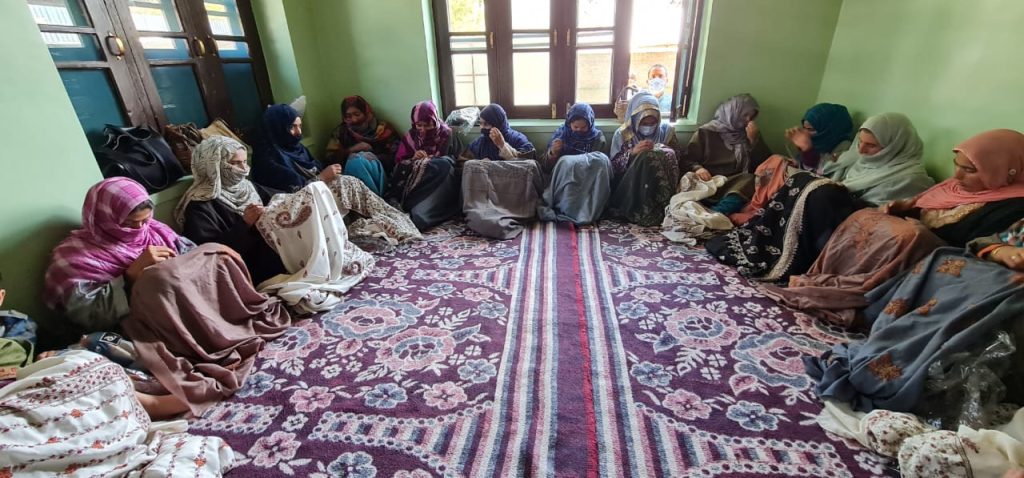
Introduction
In today’s fast-changing world, learning is not just for the young—it’s a lifelong journey. Senior citizens, with their experience, wisdom, and willingness to contribute, are an essential part of our society. Empowering them with new skills through skill development programs opens doors to self-reliance, mental well-being, and community engagement.
Why Skill Development ?
As life expectancy increases, people are staying active well into their 60s, 70s, and beyond. Many seniors want to:
- Stay mentally and physically active
- Learn digital and financial skills
- Explore hobbies and creative arts
- Start small businesses or contribute through volunteering
- Connect socially in a meaningful way
Key Skills for Seniors
- Digital Literacy: Learning to use smartphones, internet banking, UPI apps, and social media helps seniors stay connected and safe in the digital world.
- Financial Literacy:Understanding how to manage pensions, investments, insurance, and digital payments improves financial independence.
- Health & Wellness:Workshops on yoga, nutrition, and mental wellness help improve quality of life.
- Handicrafts and Entrepreneurship: Many seniors have hobbies like knitting, painting, cooking, or farming. Training them to turn hobbies into income sources builds confidence.
- Communication & Language Skills: Basic English or regional language classes help them interact better in today’s diverse society.
Success Stories
- Ghulam Qadir Shah: 65, started an online business selling handmade wooden toys after attending a government workshop.
- Shameema Begum: 69, started an online business selling handmade shawls, suits and stoles.
- Maqsooda Begum: 65, started an online business selling carpets, Namdas and Pashmina items
Government & NGO Initiatives
India’s Ministry of Social Justice and Empowerment, in collaboration with NGOs, runs many schemes like:
- Rashtriya Vayoshri Yojana
- Senior Citizen Digital Literacy Campaign
- Skill Development Centres for Elders
These provide free or low-cost training, especially in rural and urban poor areas.
Conclusion
Skill development for senior citizens is not just a need, but a responsibility of a progressive society. By nurturing their skills, we don’t just empower individuals—we build a more inclusive and intergenerational India.
Let us value the experience of our elders and support them in living independent, dignified, and meaningful lives.
OUR CSR
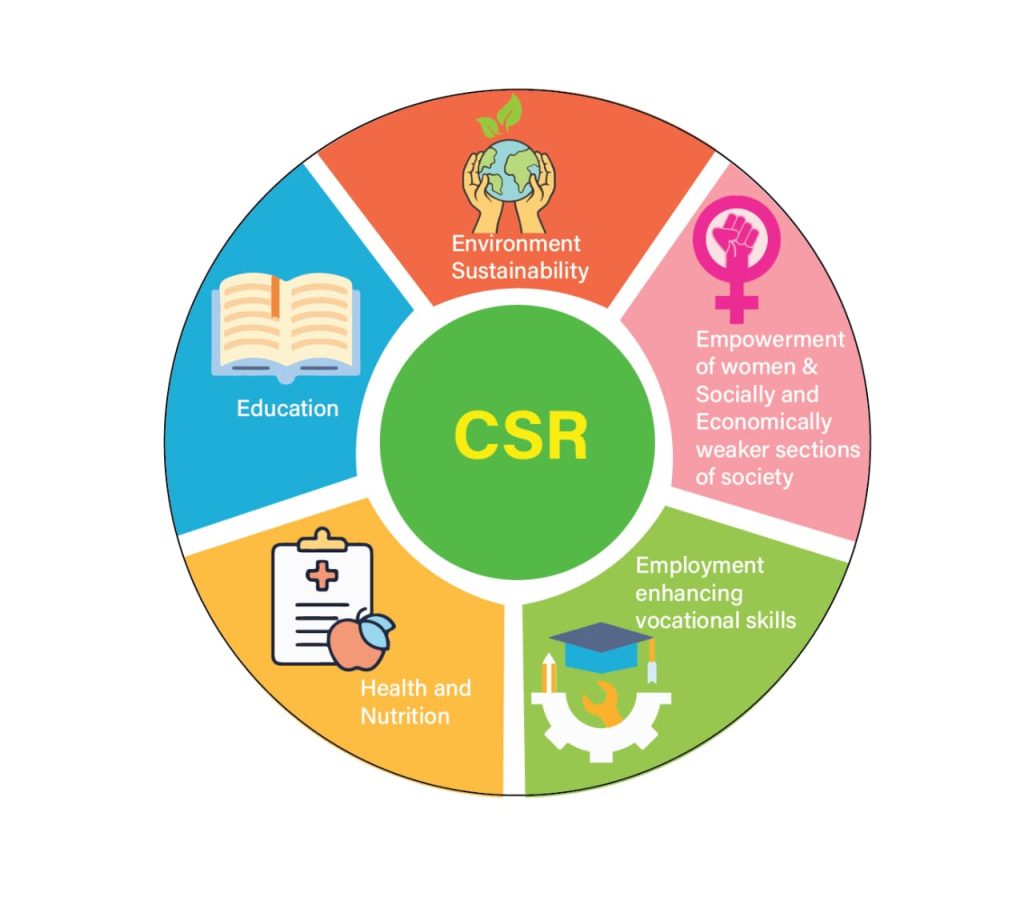
Environment Sustainability
At Noora Aman Foundation, we are committed to promoting environmental sustainability through impactful initiatives that focus on clean energy, afforestation, waste management, and climate awareness. Our CSR programs aim to protect natural resources, reduce carbon footprints, and encourage eco-friendly practices that foster a greener, cleaner, and more sustainable future for all.
Empowerment Of Women and Weaker Section of Society
At Noora Aman Foundation, we focus on empowering women and socially & economically weaker sections through skill development, education, entrepreneurship support, and awareness programs. Our CSR initiatives aim to build self-reliance, boost confidence, and create inclusive opportunities that uplift marginalized individuals and ensure their active participation in socio-economic growth.
Employment Enhancing Vocational Training
Noora Aman Foundation is dedicated to enhancing employability through vocational training programs that equip youth and underserved communities with industry-relevant skills. Our CSR efforts focus on bridging the skill gap by offering certified, hands-on training in various trades, fostering self-reliance, job readiness, and sustainable livelihoods across India.
Health and Nutrition
At Noora Aman Foundation, we prioritize community health and nutrition by conducting medical camps, awareness drives, and providing access to essential healthcare services. Our CSR initiatives aim to combat malnutrition, promote preventive healthcare, and ensure well-being for underprivileged families, especially women and children, fostering a healthier and more resilient society.
Education
Noora Aman Foundation is committed to making quality education accessible to all, especially for children from marginalized communities. Through scholarships, free learning resources, digital literacy programs, and partnerships with educational institutions, our CSR efforts aim to bridge educational gaps, empower youth, and foster a brighter, more equitable future through the power of knowledge.
